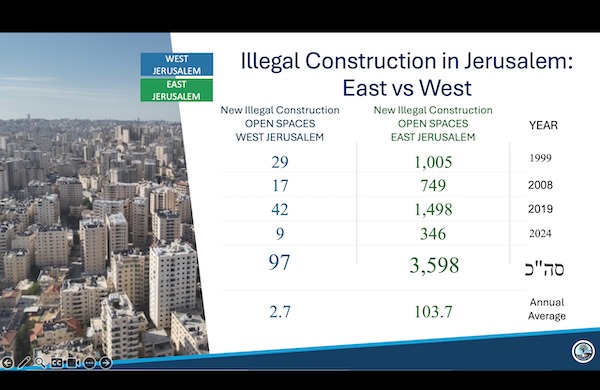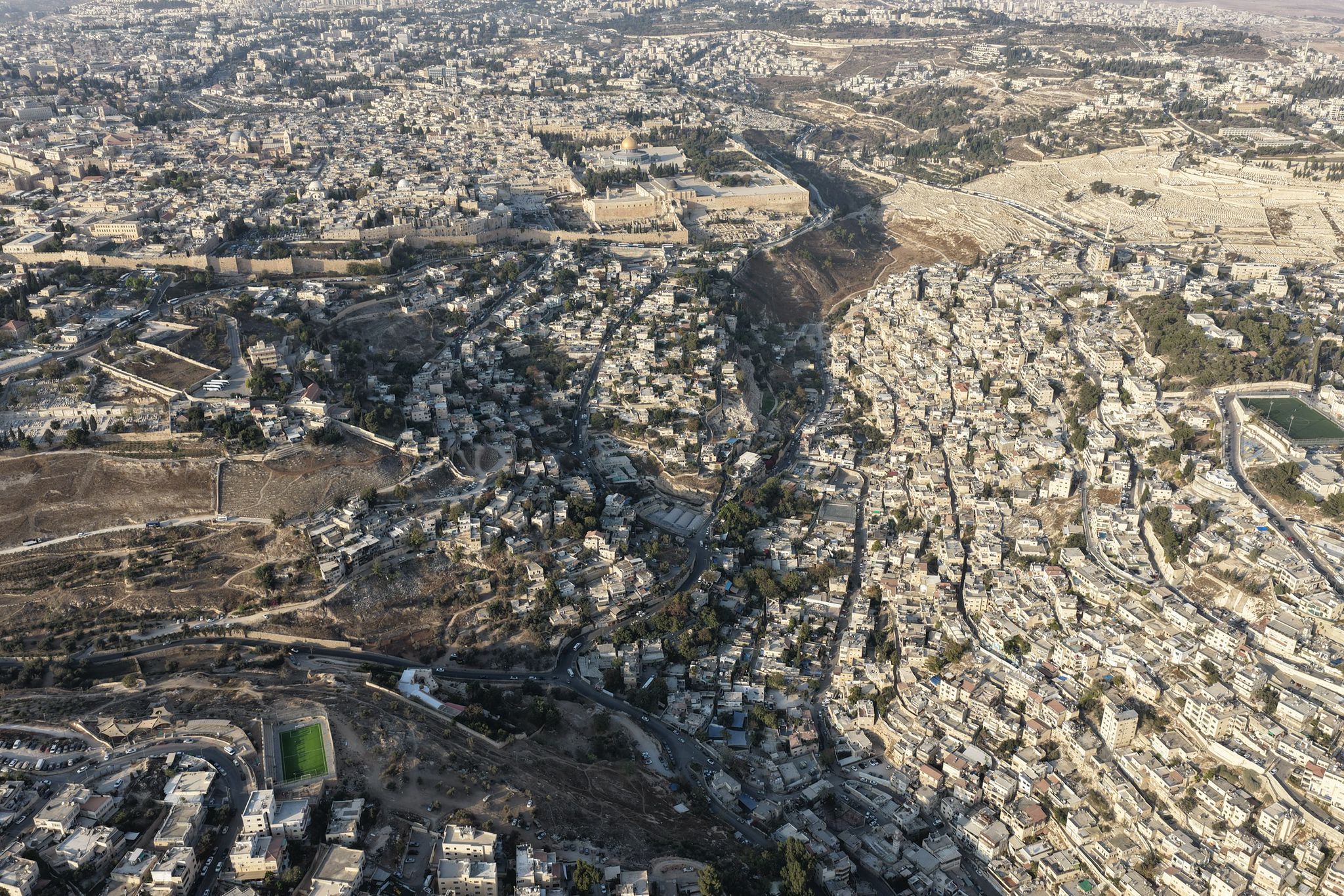At a Knesset Interior Committee hearing on Wednesday, the Regavim Movement presented new data exposing the ongoing failure to address illegal construction in Jerusalem, highlighting a stark enforcement disparity between the city’s eastern and western sides. Regavim warned: “Jerusalem’s development potential is slipping away, and Israel’s capital is fighting to preserve its Jewish majority.”
At the committee hearing, initiated by Regavim and chaired by MK Yitzhak Kreuzer, Regavim’s Jerusalem Region Coordinator Yehuda Noam presented the findings of Regavim’s recently- completed 2025 Land-Use Study, based on GIS mapping, aerial imagery analysis and extensive fieldwork, to municipal planning officials and representatives of the national enforcement units.
The study, which focuses on Jerusalem’s open spaces, reveals that illegal construction in the eastern section of Jerusalem is 40 times greater than in the west. Since 1999, 2,593 illegal buildings have been constructed in open areas in eastern Jerusalem — compared to just 68 in the west side of the city. Moreover, while 97% of all illegal construction in open spaces occurs in east Jerusalem, only about 50% of demolition orders and enforcement resources are directed there.


These open areas, intended for public use as green lungs and future development reserves, are rapidly disappearing. According to the study, Jerusalem has lost 3,503 dunams of open land — roughly equivalent in size to Yarkon Park in Ramat Gan.
Based on GIS mapping, aerial imagery analysis, and field surveys, the study refutes the claim that illegal construction stems from overcrowding: in many of the neighborhoods surveyed, population density was found to be among the lowest in any urban area worldwide. Despite significant improvements in enforcement in recent years, and a noticeable slowdown in new illegal construction, the rate of enforcement still lags far behind.
Regavim emphasized that the findings highlight a serious structural failure: “There is no comprehensive strategy, no centralized database, and no long-term planning for the preservation of open spaces in a city already struggling to retain its young population and Jewish majority.”
MK Yitzhak Kreuzer, Chair of the Interior Committee, concluded:
“The data presented here tell a story far bigger than local law enforcement. There’s an urgent need for an interagency task force that brings together all the relevant bodies, sharing knowledge and tools from both public and civil organizations.”
Noa Hedvat, Head of Planning and Infrastructure for East Jerusalem, added:
“In West Jerusalem, population density averages 15–20 housing units per dunam; in new projects it reaches 30 units per dunam. In East Jerusalem, density is about a quarter of that. Illegal construction has become the norm, and adherence to planning and building laws is extremely low. Legalizing illegal structures is unhelpful, to say the least: In fact, the municipality provides infrastructure and public facilities for these structures (roads, classrooms, etc.).”
Avi Cohen, Director of the National Enforcement Unit for Planning and Construction:
“Enforcement has improved dramatically, but the main issue is a ‘decision not to decide.’ Once responsibility is clearly assigned, the situation will look very different. For now, we’re merely maintaining the status quo.”
Moshe Wolanovitz, Land Resource Enforcement Unit, explained:
“New construction is handled quickly through administrative orders — demolitions can occur within about six weeks if there’s no judicial stay. But for older cases, it’s different: there are thousands of buildings with final demolition orders issued by the courts. Due to Section 207 of the Planning and Building Law, which allows repeated extensions, the system has become a laundering process — thousands of buildings remain in limbo.”
Yehuda Noam, Regavim’s Jerusalem Region Coordinator, concluded:
“Our research confirms what many Jerusalemites already feel — years of neglect have cost us the potential for tens of thousands of housing units, not to mention the loss of natural landscapes, heritage sites, and the urban and security challenges that come with it.” He added: “Despite the significant progress made under Mayor Moshe Lion and Minister Itamar Ben Gvir — including doubling enforcement and halving the rate of new illegal construction — the severe inequality of enforcement cannot continue. Our report calls for immediate action and includes detailed operational recommendations for government and municipal authorities. Only if we look at reality squarely in the eye and join forces to combat this problem, can we change this trajectory.”





